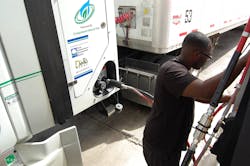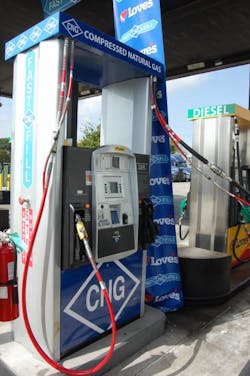Can natural gas remain a viable transport fuel?
While falling energy prices are currently discouraging buyers of trucking equipment from incurring the incremental capital costs associated with compress natural gas (CNG) and liquefied natural gas (LNG) powered units, many industry experts still feel that natural gas still remains a very viable replacement for diesel fuel from a long-term perspective.
“Lower diesel prices are tempering excitement for natural gas,” noted Wall Street investment firm Stifel Nicolaus & Co. in its transportation earnings preview report issued last week. “But natural gas engines may be the future, particularly if oil prices rebound.”
The firm added that larger carriers are particularly positioned well to reap the cost-saving benefits of switching to natural gas once economic justification becomes clearer cut, all else being equal.
Right now, Stifel said natural gas will only represent about 2% of heavy duty tractor engines for 2014 and it remains “unclear” whether that number will be higher in 2015.
Yet a new report from consulting firm Navigant Research projects that sales of all models natural gas vehicles (NGVs) – cars and light trucks on up through heavy-duty commercial units – are still expected to grow from 2.3 million units annually in 2014 to 3.9 million by 2024.
The firm said increasingly stringent fuel economy and tailpipe emissions standards in major automotive markets in particular will spur more NGV sales.Sam Abuelsamid, a senior research analyst with Navigant, noted that NGV markets in a number of global regions are expected to grow significantly over the next decade, particularly China, as they grapple with serious air pollution issues that are affecting quality of life in major urban areas.
With a large land mass and comparatively low filling station density, as well as a price differential between gas and liquid fuels, North America’s NGV market is likely to see substantial growth over the next decade, as well, he noted, though NGVs are still expected to remain a small niche of the North America, with fleet and commercial operators using dedicated private filling stations and making up the primary customer base.
Still, Stifel said in its research that while oil prices have dropped precipitously over the last several months, “diesel’s decline has not been as sharp or deep,” thus helping natural gas retain some advantages.
Indeed, the trade group NGVAmerica noted in a recent white paper that since 2009, global oil markets have been fairly volatile.
“While it may not be possible to predict where prices will settle in the short-term, some analysts believe that the current levels could put a temporary halt on new production as producers find it difficult to justify going after new supplies with oil below $60 a barrel,” the group said. “There is also the likelihood that today’s prices and reduced revenues will lead to consolidation in the oil industry, which could further drive down future production.”
That’s why Ken Diel, head of gas solutions for Direct Energy Business (DEB), told Fleet Owner that converting to natural gas must still be viewed as a “long-term opportunity” by commercial fleet operators.
“While the valuation of crude oil is a primary factor in trends across the spectrum of refined products, there are fuel price dislocations based on refining costs, distribution, marketing and taxes, amongst other variables such as supply and demand,” he explained. “Natural gas is a more domestically influenced commodity, with abundant U.S. production it maintains an advantageous relative cost.”
Generally, Diel said the best candidates for conversion remain vehicles operating on diesel that aggregately – as a fleet – consume greater than 250,000 gallons annually and traveling less than 800 miles per day per vehicle.
From that perspective, grocery distributors, waste haulers, large bus fleets, municipalities, regional and over-the-road carriers remain prime examples of strong industry sub-segments that can benefit long-term from natural gas conversion.
Also, DEB is witnessing tremendous interest in what Diesel called the “anchor tenant” model, whereby a scaled fleet operator implements a turn-key CNG contract as the “anchor,” allowing for either semi-private or public incremental station utilization.
“This particular structure can maintain various savings opportunities for the ‘anchor’ as station utilization and throughput volumes increase. In addition, this model allows for progression of adoption for less scaled fleets,” he pointed out.
Diel noted, too, that there remain price spreads for delivered natural gas based on geographic location – ultimately affecting the CNG output price. “Generally, in any area where there is fairly robust pipeline infrastructure, the business case [for converting] is extremely attractive,” he added.
About the Author
Sean Kilcarr
Editor in Chief
Sean Kilcarr is a former longtime FleetOwner senior editor who wrote for the publication from 2000 to 2018. He served as editor-in-chief from 2017 to 2018.

